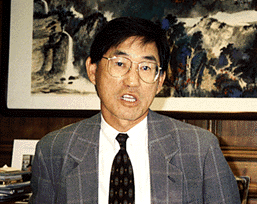|
GOLDSEA |
ASIAN AMERICAN RAGS-TO-RICHES SAGAS
RICHES FROM RAGS
PAGE 6 OF 15
For junior high Mow was sent to the Riverdale Country School, a small private
boarding school in New York. Mow recalls his years there as the most
memorable of his life. "I had the opportunity to get accustomed to
Americanisms. Living and growing up with American kids acclimated me to
American morals." With only 15 students per class, the teacher could give
the young immigrant enough attention to help him overcome the initial
language problems. By the time eighth grade began he considered himself
fluent.
Being active, Mow came to enjoy a certain amount of popularity. But
when it came to relations with members of the opposite sex encountered at
exchanges with a nearby girl's school, he was the typical shy schoolboy. In
this regard Mow may have been handicapped by his family's sudden
financial reversal. As long as Pan Tsu was a diplomat of the Nationalist
government the Mow family enjoyed a rare degree of wealth and status. But
in 1951 Pan Tsu quarreled with the Kuomingtang. Not only was he removed
from his post, but he fled to Mexico to avoid capture by Kuomingtang agents
who wanted to take him back to Taiwan to punish him for the charges against
him. Mow's mother kept Pan Tsu's plight and whereabouts from the Mow
boys until years later.
From 1952, as Mow was about to start tenth grade, the family found itself
struggling just to survive. The Riverdale School graciously gave Bill a
scholarship that required him to work as the morning receptionist, coming to
school two hours earlier than the other students. To feed the family Mow's
practical and industrious mother, who still lives in New York near two of her
sons, opened a Chinese restaurant in Great Neck called the Yangtse River Cafe
in memory of the family's boat journey from Chentu to Shanghai. Asked if
the restaurant was a success Mow gropes for the right words. "It achieved its
purpose. It fed us." He also recalls that often all he found in the refrigerator
at home were cockroaches.
"What matters isn't life, it's the courage you bring to it," Mow quotes in a
completely different context. The line is from Joseph Conrad's Victory,
a book, we later learn, that Mow first read at Riverdale. One can't help
wondering whether Mow, an otherwise unliterary man, recalled that
particular line of all the classic lines from high school texts because it had
somehow illuminated his family's hard times. He credits those times with
instilling in him and his brothers the desire to succeed. "It was very difficult
for my mother, but it was probably the best thing that could have happened
to us." All the Mow sons, with the exception of the oldest who died in 1974
of a viral infection in Vietnam while on a business trip, have become
remarkably successful. Second son Harry, who is six years older than Bill, is
now chairman of Century West Development in Santa Monica. Third son
Donald is a successful New York architect. Fifth son Van is chair professor of
Columbia University and sixth son Maurice is a professor at Chico State
University.
Mow led something of a double life during his last three years at Riverdale.
During the week he lived with boys from the wealthiest families in the world.
On weekends, when not captaining the school's soccer team in a match, he
was toiling at the Yangtse River Cafe. "My weekly allowance was 20 eggrolls,"
he recalls. "I took them to school when I returned for chapel on Sunday and
sold them in the snack bar for a quarter apiece. There was always a line of
boys waiting to buy them. You had to be a good friend of Bill Mow's to get
your hands on one of those eggrolls." Mow credits that with being the start of
his business career.
PAGE 7
PAGE 1 |
2 |
3 |
4 |
5 |
6 |
7 |
8 |
9 |
10 |
11 |
12 |
13 |
14 |
15
|
|
|
|

<
|
“My weekly allowance was 20 eggrolls.
I took them to school when I returned for chapel on Sunday
and sold them in the snack bar for a quarter apiece.”
|
CONTACT US
|
ADVERTISING INFO
© 1996-2013 Asian Media Group Inc
No part of the contents of this site may be reproduced without prior written permission.
|







